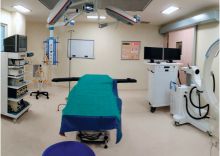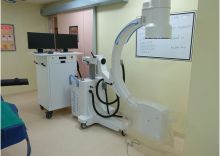Prostate cancer is a common malignancy that develops in the prostate gland, a walnut-sized organ in men that produces seminal fluid.
Some prostate cancers grow slowly and remain confined to the prostate gland, but others may be aggressive that spread quickly.
For early intervention and treatment, book an appointment at the best hospital in Kanpur, Ujala Cygnus, for prostate treatment.
Types Of Prostate Cancer
Prostate cancers are mostly adenocarcinomas that develop from the gland cells. Other types of prostate cancer that start in the prostate are:
- Small cell carcinomas
- Neuroendocrine tumours
- Transitional cell carcinomas
- Sarcomas
Treatments For Prostate Cancer
Treatment for prostate cancer depends on various factors, such as the stage of the cancer, its aggressiveness, and the patient’s age and overall health. Treatment options may include:
- Prostatectomy Surgery
- Radiation Therapy
- Hormone Therapy
- Chemotherapy
- Immunotherapy
Recovery And Aftercare
After your prostate cancer treatment, you will attend regular follow-up appointments based on your care plan to monitor progress and track any changes.
The doctor may conduct a digital rectal examination and Prostate-specific antigen (PSA) blood test to detect recurrent prostate cancer.
Some men may experience side effects such as urinary problems, erectile dysfunction or fatigue which may be temporary.
You need to exercise regularly, stop smoking, and seek treatment for sexual health in case of erectile dysfunction.
When Should I See A Doctor?
If you experience any of the following symptoms, you should consult a doctor promptly:
- Frequent urination, especially at night
- Difficulty initiating or stopping urination
- Weak or interrupted urine flow
- Blood in urine or semen
- Pain in the pelvic area
- Erectile dysfunction
- Unexplained weight loss or fatigue
Cervical cancer is a common yet highly preventable form of cancer that affects the cervix. Anatomically, the cervix is the lower part of the uterus that connects to the vagina.
Our medical experts at Ujala Cygnus in Kanpur recommend regular screening to manage cervical cancer effectively.
Types Of Cervical Cancer
2 main types of cervical cancers are:
Squamous Cell Carcinoma: This type of cancer affects the flat cells found in the lining of the outer part of the cervix.
Adenocarcinoma: The affected cells are the column-shaped glandular cells in the cervical canal.
Treatments For Cervical Cancer
Common treatment methods are
- Surgical interventions may include total hysterectomy, radical trachelectomy, and pelvic exenteration.
- Radiation Therapy
- Chemotherapy
- Targeted therapy.
Early-stage cancers can often be successfully treated with surgery alone, while more advanced cases may require a combination of treatments for optimal results.
The medical expert team creates a personalized treatment plan based on the patient’s unique case.
Recovery After Cervical Cancer Treatment
After treatment, you will have to attend follow-up appointments for regular monitoring, exercise regularly, quit smoking, eat a healthy diet, and get in touch with support groups for emotional support.
The multidisciplinary team provides comprehensive care, including pain management, counselling, and rehabilitation, to facilitate a smoother recovery journey.
When Should I See A Doctor?
You should see a doctor if you experience the following symptoms:
- Abnormal vaginal bleeding
- Pain during intercourse
- Pelvic pain
- Changes in urination and bowel habits.
Regular Pap smears and HPV testing are recommended for early detection.
If you are due for a screening or notice any concerning symptoms, consult our experts today.
Some Key diagnostic measures commonly used for cancer detection:
Laboratory Tests: Many different tests are conducted to detect chemical components in blood and urine. Some common laboratory tests are:
- Blood tests
- Complete blood count
- Urine analysis
- Tumor markers
Imaging Techniques: Diagnostic imaging produces images of internal structures to visualize tumours and their characteristics. Some commonly used imaging methods are:
- X-ray
- CT scan
- Ultrasound
- Magnetic Resonance Imaging
- Bone scan
- Lymphangiogram
- Mammogram
Endoscopic Examinations: Types of endoscopic examinations to detect cancer are:
- Cystoscopy
- Colonoscopy
- Endoscopic retrograde cholangiopancreatography
- Esophagogastroduodenoscopy
- Sigmoidoscopy
Genetic Testing: Different genetic tests detect gene mutations.
- BRCA testing
- HER2 testing
Tumour Biopsy: Tissues or cells removed from the body are studied under a microscope. Common types of biopsies are:
- Fine needle aspiration (FNRA)
- Endoscopic biopsy
- Bone marrow biopsy
- Excisional or Incisional biopsy
- Punch biopsy
- Skin biopsy
What Are The Cancer Treatment Approaches In Kanpur?
Treatment approaches for cancer depend on the patient’s medical condition and type of cancer.
Surgery: This involves removing the tumour and nearby tissues if necessary. It’s most effective for localized tumours that haven’t spread to other body parts.
Chemotherapy: Chemotherapy uses anti-cancer drugs to kill rapidly dividing cancer cells and prevent them from spreading to other body parts.
Radiation Therapy: This treatment uses high-energy radiation to kill or shrink cancer cells and tumours.
Immunotherapy: Immunotherapy, or biotherapy, boosts the body’s immune system to fight cancer cells.
Hormone Therapy: This treatment uses supplemental hormones to prevent the growth and spread of tumours.
Biologic therapy: The treatment uses substances that are produced naturally in the body and prevent the growth of cancer cells.
Stem Cell Transplantation: Stem cell transplantation, or bone marrow transplantation, replaces damaged bone marrow with healthy stem cells.
Book a consultation with a medical expert if you are looking for comprehensive cancer care services in Kanpur within an affordable range.
















